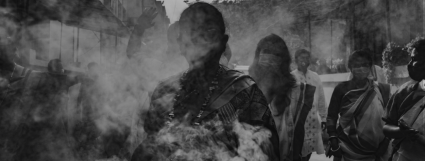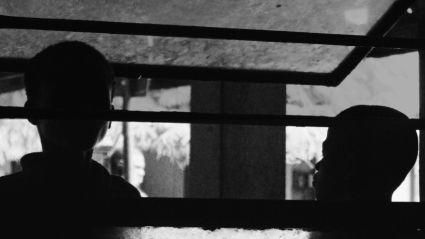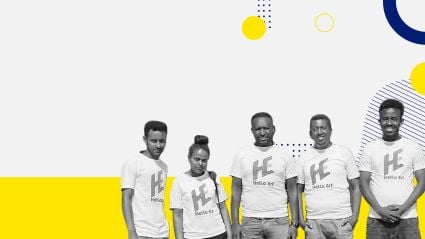
This photo-essay from Nigerian photographer Femi Amogunla features portraits of seven individuals impacted by COVID-19 in Oyo State, Nigeria.
In 2019, over 92 million Nigerians lived in extreme poverty, surviving on less than $1.90 a day. A year later, this number has increased by over 12 million, meaning that now 51 percent of Nigerians live in extreme poverty. This increase of the country’s poverty figures cannot be disconnected from the impact of COVID-19, which has pushed many poor Nigerians into even deeper poverty. This photo-essay features residents of the Elebu Community in the town of Moniya, a semi-rural part of Ibadan, in Oyo State. The images and the interviews below show how COVID-19 shrinks already limited means of income. Despite the hardships they face, the residents pictured here remain connected by the resilience expressed in the adage, “This too shall pass.” When? How? They cannot tell.
Mayi

“People can no longer go out freely to work and get money. They have to live on the little they have as savings.”
Mayi Rafa measures her age by the age of her first child who she says is over fifty. Before the pandemic, on every Moniya market day, Mayi would sell her bottles of palm oil from a small tray. On a regular market day, if she sells all her wares, she makes about N600 (or about US$1.50). Her palm oil is largely bought on credit. After selling, she repays her creditors and keeps the profit for her next purchase. Even though there was no complete lockdown in Oyo State, her sales fell during the COVID-19 restrictions.
“People can no longer go out freely to work and get money,” she says. “They have to live on the little they have as savings.” She says that in Yoruba that this is what likely accounts for the slow sales, which have also affected her ability to repay her loans.
Recently she borrowed some money from her neighbor, hoping to repay it after some days. However, since sales were slow, she could not repay the loan. She ended up eating from the products she purchased with the money.
“It is making a living that repays debt,” she says, noting she eventually sold the wares and made the repayment. As we speak, she calls over a young girl who is hawking èko, a local delicacy made from corn, takes one, and promises to pay the girl back next time.
“I don’t want to tell you how many times I eat daily. That èko may be the last thing I will eat today.” It is not yet 3:00 pm.
Fifteen years ago, Olabamiji Latinwo retired from his job as a tailor. He says that he learned about the symptoms of COVID-19 from people who had heard about them on the radio. His cluster of houses, though, does not have access to electricity so they are unable to get official information from radio announcements. During the COVID-19 pandemic, Olabamiji’s income has suffered, as financial support from his children has fallen.
“Eating and finding money to buy whatever our heart desires has ceased. There is no money anywhere. You know people like us these days just wait to be fed, but what happens when the children we depend on can hardly afford two square meals daily?”
Olabamiji says that his children no longer visit him, and this also has a painful effect.
“Our children can’t even come around because they know that the virus kills old people faster than it would young people. So they only call. We no longer receive the usual allowance each time they visit. We eat what we see these days.”
“We are just hoping that God will quickly intervene, as hunger is now the order of the day.” He prays, his hands clasped together.
Mudasiru

“We have to keep pushing and be hopeful that the little we make per day we will sell such that we will not go to bed hungry.”
“Corolla virus”—Mudasiru starts to describe the virus as she says she has heard other people call it—“is a disease that cannot be seen but kills. It can be overcome. Just obey whatever they ask you to do. Wash your hands, cover your nose and don’t be unfortunate. Once you begin to sneeze and cough now, the next thing is death.”
Before the virus struck, Mudasiru made wàrà, a local cheese, and earned little. She had also learned how to make black soap in order to augment her income, following a relative’s promise to invest in her new trade.
“But,” she says, “corolla virus came and he could not keep his promise. Even the soap that I made myself, I have not been able to sell.”
She says that even her wàrà business is slow because people are more particular about what they eat.
“The business is even more delicate since it is something that goes into the mouth. I had to drastically reduce the amount of bowls I make. What you hear is, ‘We can’t buy since we do not know where and how exactly you made it.’”
She says that she now makes wàrà in small batches so she can survive. When she goes to sell it, she wears a mask most of the time, though she also sometimes forgets it.
“We have to keep pushing and be hopeful that the little we make per day we will sell such that we will not go to bed hungry.”
Wulematu

“For about a month, we were asked to stay indoors and what was even worse than the virus—hunger—kept attacking us. We were asked to sit down at home and allow hunger to finish us.”
Wulematu used to sell kerosene years ago, when she was much stronger. However, as the years passed, her bones became more brittle, and her kerosene tanks began to leak. And so, she stopped. She began selling palm kernel shells. She would go to the farm to pick the palm kernels, crack them, and sell the shells.
Someone like Wulematu has to leave her home to be able to afford to eat. She has to go to the farm to pick the kernels and then to the market to sell. When the restrictions started, fewer people came to the market, and she couldn’t sell her bags of palm kernel. This has made it even more difficult for her to make a living.
“For about a month, we were asked to stay indoors and what was even worse than the virus—hunger—kept attacking us. We were asked to sit down at home and allow hunger to finish us.”
“We are tired of it all,” she adds, and then she expresses her doubts in the existence of the disease. “Me, I have not seen anyone that suffers from it with my two eyes. Seeing, they say, is believing.”
Suliatu

“These days, all I do is to sell for survival just so we can have something to eat. No more, no less.”
For seven years, Suliatu has sold roasted fish. She buys fish in cartons and smokes or fries it—a business she learned from her mother. Even though she is usually able to predict her profit based on the cost of fish, unforeseen circumstances can make this harder. Until recently, she never imagined that a virus could affect her business the way it has.
Before the current pandemic, she had taken a loan to support her business. When COVID-19 struck, she could no longer keep up with the repayment plan because she was not selling enough fish. A mother of 4, who lost her husband on the same day she gave birth to her youngest child, she was also struggling to pay her children’s school fees.
“I had to take another loan of N120,000 (over US$300) from another institution, hoping that getting more to sell will increase my chances to return these loans, but it has all been in vain.” This has led to the microfinance banks going after her guarantors, one of whom had to pay some of Suliatu’s debt on her behalf. “She came here yesterday to express her disappointment over my inability to return the money. She had to pay 20,000 out of this money to this other institution, yet they keep calling her about the fact that I have not been reachable.”
“I never envisaged this virus would come and hit us like this while borrowing these loans. The kind of business I do comes with a lot of risk. If I am unable to sell the fish in a day, they go bad. Before now, there were times I sold off all the fish before noon but now when it is unsold, we end up either eating even the rotten ones or throwing them away completely. Things are so bad these days, I sometimes wonder if I am not currently under any spell. Things are really difficult.”
Suliatu says that the fish prices have been fluctuating since the COVID-19 pandemic started and since her customers have less money to spend, her profits are also lower.
“Today, you go there to buy and the following day you are asking yourself if it was not just yesterday you visited the place. Things are no longer the same, I can’t deceive you. Things are getting more expensive by the day, there’s little or no patronage at all. These days, all I do is to sell for survival just so we can have something to eat. No more, no less.”
Taye

“Things are pretty hard and difficult. Now, I am just wondering, how I will get money to continue the business after the virus?”
For about ten years now, Taye has been selling foodstuffs—rice, beans, vegetable oil—from her home. While she has had several challenges in the business—people buying on credit but never repaying, price fluctuations— nothing prepared her for the enormity of COVID-19’s economic impacts.
Before this pandemic, she was able to make daily savings of about N300 from her business. On good days, she saved N500 (about US$1.25).
“At the inception of the virus, everybody was asked to stay indoors. The little money we had was what we were spending, and what the virus met in the shop was shared into equal halves—the first half was eaten, the other half sold. When we finished selling, we had to start spending the money for survival.”
Taye is unable to travel to buy more of what she needs. During the lockdown, inter-state travel was banned, as such, she was unable to travel to buy foodstuffs from the northern part of the country where she would ordinarily buy them.
“Though there are stories of people buying their way through security personnel on the roads, I cannot make the trip because I don’t even have the money…Things are pretty hard and difficult. Now, I am just wondering, how I will get money to continue the business after the virus?”
Jemilatu

Before COVID-19 struck, Jemilatu was selling puff-puff, a local snack made from flour, which she has fried for twenty years. Rain or shine, she would be at the Elebu bus stop by 6am frying and selling puff-puff to passersby, especially students. When the restrictions started, schools were shut down, many offices were closed, and her sales dwindled. In the first weeks, she had to throw away some of the excess snacks.
When asked what she knows about the coronavirus, she equates it with death. To protect yourself, she says, “You must hide yourself. You don’t go to see anybody. You wash your hand with ‘sanitasa’ and then cover your mouth and nose.” She said that she overheard some of these recommendations from the radio on her way to her workstation.
“These days you finish selling and you are still looking for where to borrow money to add to what you are going to use to pay off your debt.”
Before COVID-19, she bought most of the materials for her puff-puff—flour, oil, and sugar—on credit, from loans she took from several people. However, since the restrictions, the prices of goods have gone up, making it tougher for her to pay her loans back.
“Flour is now N13,500 from N10,500; vegetable oil goes for N15,000 as against N11,000. These days you finish selling and you are still looking for where to borrow money to add to what you are going to use to pay off your debt.” She says that this has pushed her to take a loan from a microfinance bank from which she borrowed N50,000 to repay N65, 000 within 23 weeks.
“My prayer now is that this disease should go… We live in fear now because the future of my business is at stake.”









